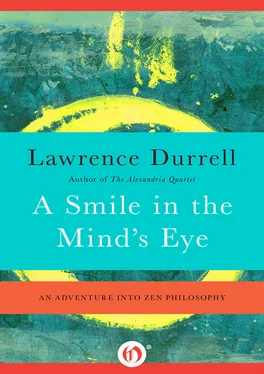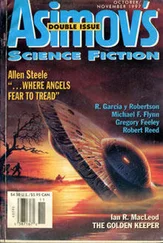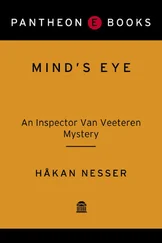Well, all this was in the past now, but my memories of these episodes were still fresh, and the time of day I had chosen to descend on the sacred fountain was appropriate to the theme of my reflections. Moreover it was snowing, and heavily snowing at that. Ice crunched under my wheels. The villagers were shuttered and huddled upon themselves with only plumes of smoke from cottage chimneys to suggest human habitation. I could hear the roar of the distant fountain as it crashed out of the rock-face into the great circular pool where it lashed and writhed, for all the world as if it were boiling hot. The town was in darkness save for a glim here and there; one point of light shone from the little hotel where we had once stayed. I laid the car up in the snowy park and with my nose well tucked into my scarf ran down the pathways by the racing river to the glassfronted door of the place where I knocked once or twice rather sharply, in order to be heard above the roaring water. The madam of the establishment who was busy somewhere in the depths came short-sightedly towards me with a torch. Who could it be at such a time, on such a night? She did not at first recognize me but, good trusting soul, came towards me to parley through the glass door. It did not take long to recall who I was and she let me into the bar where I drank a welcome hot grog while she sat and kept me company. The place had not yet opened for the tourist season but she had come over for the weekend to test the heating and water systems; and indeed the heating was on and the whole place cosy. She offered to lodge me for the night but I preferred to sleep high up by the fountain in my little camper; but I would not say no to a sandwich. ‘A sandwich!’ she cried indignantly. ‘You shall dine properly in my hotel.’ It did not take long to prepare; she served me a trout with almonds — the trout grows à domicile here — followed by a good cheese with a bottle of Côte de Ventoux. And while I ate she came to talk to me in her kind and desultory fashion. Where was the blonde lady, she wanted to know? She was in Africa. ‘Once after your visit she came back here alone.’ I knew this for Vega had written to me from here, and in the same sort of season, for she described the heavy snow falling and being smoothed away in the racing water — and then an unusual touch which I had just come upon myself; the great trout were rising to the snowflakes and taking them as if they were bait! ‘A strange place to bring an unhealed love-affair.’ That was how she had once put it, referring to Petrarch. After dinner I ploughed my way up into the ravine as far as the macadam goes, and then turned off with my nose to the cliff to doss down. The intense white glare of the snow reflected so much light that one had the illusion that there was still a lingering twilight. The roar of the water was deafening; it was like being in the engine-room of some great ship, sleeping between the pulsing sweating turbines as they drove one rushing through the sea. What a lapidary’s wheel on which to polish the first elegaic poems of an entire epoch! One’s whole consciousness was quite engulfed in this steady drumming — as if upon a heavy vellum drumhead. The snow was falling in great meshes and wreaths and chaplets, and the water was swirling and polishing the black cliffs as it streaked for the sea. The river hereabouts is too fast for the fish, but a little lower down it is dark and pithy with trout. I made up my bed, heated up and then switched prudently off before turning in. It was wonderfully healing, the boom of the river — the dense cocoon of sound swaddled every nerve. Old conversations came back to mind, lazily, as if projected upon the darkness, wrestling with the desire to sleep.
‘And Laura, was she real?’
‘Does it matter?’
‘Yes and no.’
‘If invented she was still as real as any of his readers — as you or I are.’
‘And if real she was only the ghost of an echo of a mood. In the book she dies, remember?’
‘Africa! Sitting here in this roaring nautilus of sound he dreamed of Africa and read St Augustine.’
‘And so for Laura there were many candidates for the part.’
‘What names! What beauties!’
‘Laura di Audiberto [Hugo de Sade’s wife], Laura di Sabran, Laura di Chiabu, Laura Colonna …’
‘An all-star cast.’
‘All star-crossed women.’
‘The Happy Few rather.’
Or are human beings just recordings made by some terrifying voice from elsewhere?
In my half-sleep I was reminded of a story by Queba the Lebanese in which a famous writer manages to project his heroine to such good effect that the public believes her to be based on some real women. Scents are named after her, and streets, and newborn children. But the author himself has never been seen out with a woman. Always alone. Scenting a story, in the manner of journalists, a woman editor asks her newspaper to announce a ballot — the public must vote for a real or imagined original for the famous heroine. They vote overwhelmingly in favour of an imagined heroine. The auther is beside himself with anxiety and sorrow. ‘She is not real enough, then, and she will never arrive.’ So he goes home in despair and takes his own life, having at last realized the truth. Of his last story nothing remains save the enigmatic title it was to bear Death Has Blue Eyes.
The water went on, rubbing and polishing its own echoes, drumming upon the darkness, upon the soft wadded walls lining the convolutions of some marvellous sea-shell. The thread which I held in my fingers I had first picked up — the clue, the inkling — from the great stone Gorgon in the island of Corfu — her cartoon of gay madness, ecstasy, hypomania — call it what you will. The clues led steadily on, and upon them I had threaded these experiences, all related and all congruent to a poetic life and practice. Where would it next lead me? I did not know, I did not care. Somewhere in Africa Vega would be writing me a letter, probably reproaching me for some un-Roman weakness, for she was a girl who did not spare her friends. I had written, saying: ‘I am beginning to feel like some very old and moulting penguin left upon a small and rapidly melting ice-floe — call it European culture. Lord God, send the bomb, I sometimes cry! Then I think of Vega, and, with a gesture, I stay the blow! Not yet, for Vega lives!’ In her last letter — so many months ago — she enclosed the French text of a Chinese poem called ‘Woman’ which I Englished for a friend in the following manner. She did not say where she got it, and I have hunted in every likely place and asked my friends to hunt in Paris. I apologize if I have broached a copyright.
WOMAN
How sad it is to be a woman!
Nothing on earth is held so cheap;
When boys stand leaning at the sill,
Like Gods tumbled out of Heaven.
Their hearts compass the Four Oceans,
The dust and the wind of a thousand thousand miles.
But no one is glad when a girl is born –
By her the family sets no store.
When she grows up she hides in her room
Scared to look a man in the face.
Nobody cries when she leaves her home, save she.
As suddenly as clouds when rain pauses,
She bows her head, composes her face, her teeth
Are pressed into her red lips, she bows and kneels
O! countless times. She must humble herself even to servants.
His love is as distant as a star,
Yet always the sunflower turns towards the sun.
Her heart is more sundered than water from fire,
A hundred ills are heaped on her; her face will follow
The changes of the years, will wear its age.
Her Lord will find new treasures.
They that were once like substance and shadow
Are now as distant as Hu from ch’in [two places]
Читать дальше











